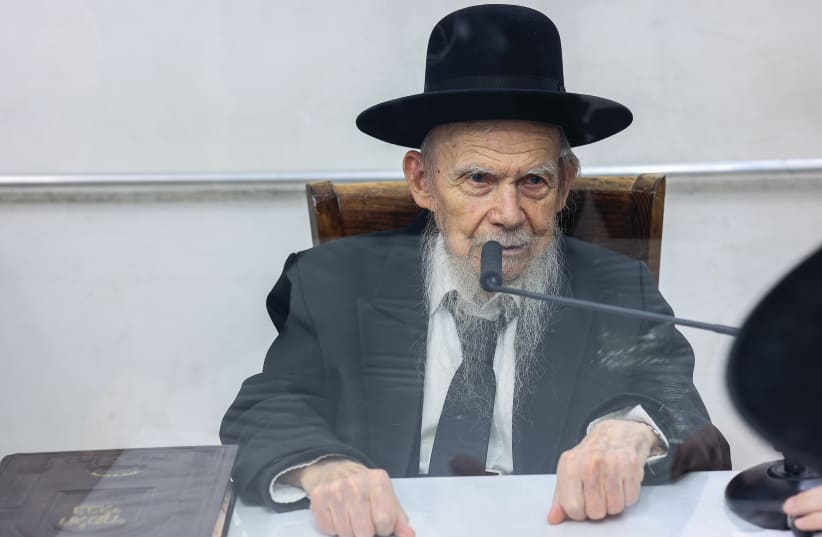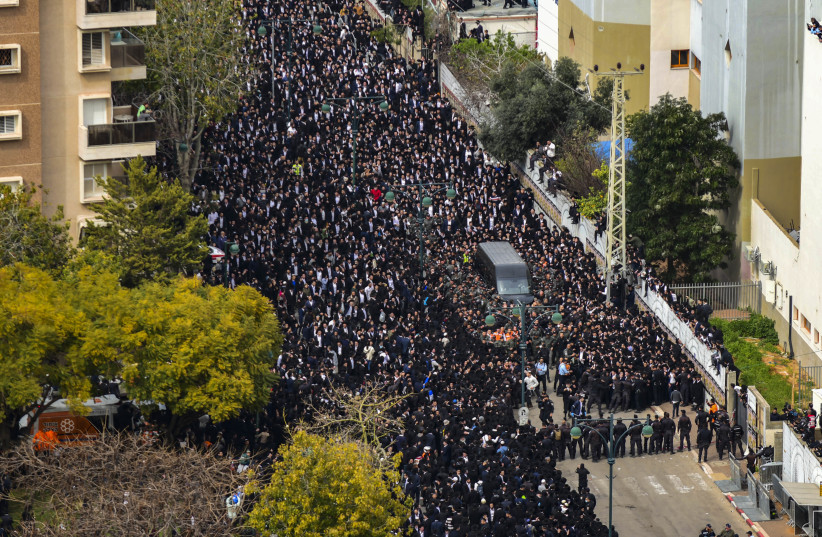A week ago Friday Rabbi Shmaryahu Yosef Chaim Kanievsky – known as the Prince of the Torah (or in Hebrew: Sar Hatorah) – died at the age of 94.
Rabbi Kanievsky, the spiritual leader of the Litvak branch of haredi Judaism in Israel since 2017, when Rabbi Aharon Yehuda Leib Steinman died, was a pious, modest and humble man, well versed in the Torah and Halacha, and an authoritative posek, who is reported to have spent 17 hours each day studying the Torah.
His funeral on March 20 was said, by haredi circles, to have been attended by 750,000 followers (the police gave the more “modest” figure of 350,000), but whatever the correct figure, he was without doubt greatly loved and revered by many. During his lifetime, thousands of persons knocked at the door of his modest home in Bnei Brak every year, to ask for advice and a blessing.
Because the police did their best to allow the giant funeral to go by as smoothly as possible, and without any incidents or accidents, life in Gush Dan was more or less put on hold for a whole day: main roads were blocked, many members of the general local population were unable to get to work, and many schools were closed, with classes in some being carried out by means of Zoom.
It is said that there was a lot of grumbling and anger in certain secular circles, but I believe it was not so much because of lack of empathy, or because the “spoiled seculars” from Tel Aviv refuse to be generous with the haredim (as some accused them), but mostly because they had little time to get organized (Kanievsky died on Friday afternoon, and the funeral took place on Sunday morning).
Kanievsky did not play an active role in Israel’s public life, but was frequently asked to provide guidance to his own flock on current issues, such as smartphones, or on whether to follow Health Ministry guidelines concerning the COVID-19 pandemic. Especially in recent years, it is not at all clear whether Kanievsky fully understood the issues he was being asked to respond to. I recall that during the peak of the first COVID-19 outbreak, when the government decided to shut down the schools, Yanky – Chaim Kanievsky’s grandson, who attended him and acted as his spokesman to his very last day – was seen and heard on television telling his grandfather that there was a mageife (epidemic) going on, and that the government wanted to prevent the children from attending classes, and asked him whether he approved. Kanievsky mumbled something, and Yanky announced that he objected.
Though the secular public was impressed by the man’s modesty and mild demeanor, and there were some who actually came to see the old rabbi, there was really very little in what the rabbi represented they could identity with in terms of his perspective on life, and his views on the role that his followers should play in the Israeli public arena. He seemed more concerned with the approach of the Messiah than with how the haredi society can (or should) better integrate into the general Israeli society and contribute to its well-being. He also represented positions that are anathema to any liberal and progressive person, such as opposition to women’s equality and haredi women being elected to the Knesset, or consulting scientists on pertinent scientific issues.
There is a famous story told about a miracle that occurred to Kanievsky while he was studying the issue of whether grasshoppers are kosher. If I understand correctly, there are rabbis who have ruled that grasshoppers should be regarded as nonkosher, because we do not know enough about them. Others consider certain species of grasshoppers with particular physical attributes to be kosher. Kanievsky was having difficulty deciding the issue because he had never seen a grasshopper in his life.
Then, according to the story, a miracle occurred and a grasshopper jumped into his room through the window, and Kanievsky was able to observe it carefully from close quarters.
It all sounds great, except that there is a problem with this story. In the world there are about 8,000 species of grasshoppers – in Israel there are around 100. Since not all the grasshoppers are kosher (at least according to those who believe that grasshoppers can be kosher), what is the value of a single grasshopper, of an unknown species, jumping in through the window? Certainly, it would have been much more useful (if the story is true) if Kanievsky had contacted a zoologist who is an expert on grasshoppers and consulted him on the physiology of the various species of Israeli grasshoppers.
MANY SAY that Rabbi Kanievsky’s death has left the Litvaks leaderless. That is not accurate, because now the 98-year-old Rabbi Gershon Edelstein will assume his spiritual role, and someone else, from a younger generation, will emerge after Edelstein is gone. For some reason it is assumed that whoever this person will be, he will not be as great a scholar as the members of the generation of haredi spiritual leaders that is rapidly vanishing (those born in the first third of the 20th century), but it is possible that he will be more “modern” in his approach, and pave a new path for the rapidly growing haredi community – or at least its Litvak branch – that will take it in a slightly different direction in so far as its relationship with the state is concerned, though without losing its unique values and way of life.
But perhaps it is unrealistic to expect a haredi spiritual leader to adopt the famous words of US president John F. Kennedy spoken 60 years ago: “Ask not what your country can do for you – ask what you can do for your country.” This is because for the haredim the State of Israel, which has not adopted the sort of Judaism that they profess, is at best tolerated by them, while being exploited for their own interests.
We do not really know whether Kanievsky had anything to do with the antagonistic and aggressive positions adopted by Torah Judaism in general, and the Litvak Degel Hatorah Party within it, in particular, against Naftali Bennett’s government formed last June without them.
It will be especially interesting to see how the haredi parties will emerge from their current experience in opposition. But that is already a different story.

